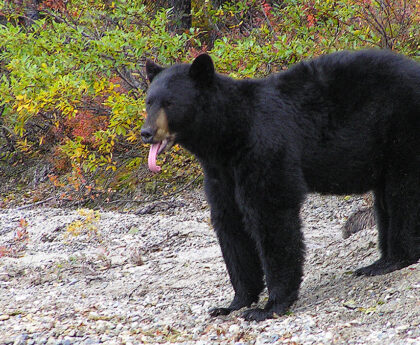Few animals can eat as many different types of plant and animal matter as bears, they willingly consume everything from carrion to cabbage.
Since every species of bear that regularly cross paths with humans have voracious appetites and need to eat around the clock, food is a big issue.
That makes it easier to understand why bear problems
frequently result from interaction with human food.
You need to understand bear behavior, they are shy creatures and will usually avoid human contact, yet hunger drives them to houses and towns in search of their next meal.
You’re most likely to come into contact with bears dangerous to people when your garbage is not properly secured, since garbage cans are the equivalent of a lunch pail to a hungry bear.
It’s how bear problems start.
Bear behavior dictates a cycle of activity in spring and summer before a hibernation during the winter.
During the period of activity in warmer months, a bear cannot get enough food to satisfy their roaring metabolism and is likely to come into contact with humans who boast their own sizable food stores.
Since bears need to put on hundreds of pounds of fat in order to survive winter, they eat every hour they are awake and do not care what the source of their next meal is.
No simple garbage can is a match for the immense strength, hunger and desire of a bear, whether it is a juvenile black bear or a half-ton Kodiak.
Their claws can tear through weak plastic or aluminum while their muscles can overpower and knock down a can that no human could budge.
The goal is to control bear damage and defend against bears becoming a nuisance.
In regions where bears frequently roam, such as Alaska or continental state parks, attacks due to careless disposal of waste make the headlines each year. Around residences these nuisance bears can become a real problem.
YES bears are dangerous to people
Poor food and garbage storage can put your property or even your life at stake in areas where bears regularly roam through in search of dinner.
So don’t feed bears.
